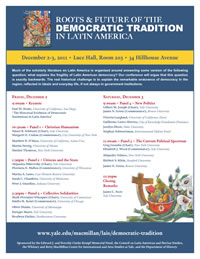
To address the long, complex, and occasionally counterintuitive history of democracy in Latin America, the Latin American Studies programs of Yale University, Columbia University, and New York University organized two coordinated conferences in 2011.
Continuing the conversations that were initiated at NYU in April 2011, Professor Stuart Schwartz (History) convened Roots and Future of the Democratic Tradition in Latin America at Yale on December 2-3 with support from the Edward J. and Dorothy Clarke Kempf Memorial Fund and the Center for Latin American and Iberian Studies through a Title VI grant from the U.S. Department of Education. Over two days, 27 scholars of Latin American history, anthropology, sociology and politics engaged with each other and conference attendees along several subthemes, such as “Christian Humanism” and “Collective Solidarities.” Here, presenters explored both theoretical arguments about the nature of Latin American democracy and historical examples of “democracy in action.” In examining a range of topics from proto-democratic notions of religious rights in colonial Mexico to Brazilian anti-dictatorship student movements, the participants took up Professor Schwartz’s challenge to understand why scholars have “ignored the persistence, despite nearly three centuries of violent challenges, of the ideals and institutions of Latin American democracy.”
Characterized as a “great success” by Professor Schwartz, the conference concluded with the closing remarks of Professor James Scott (Political Science), who offered comparisons between social and political traditions in Latin America and Southeast Asia, and reiterated the need for continued study on this topic.
